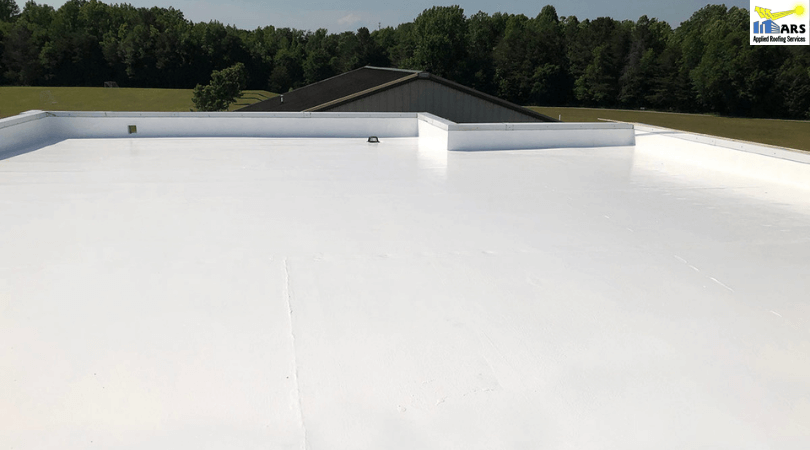


There are several different types of commercial flat roofing systems. The type of roof you decide to use on your business is ultimately up to you, but certain types of roofing do have more advantages on specific types of buildings.
Commercial flat roofing systems are a cost-effective option, as they require fewer materials than steep-sloped or pitched roofs. They can be constructed with a wide range of materials, from PVC to built-up roofing and TPO. These roofs provide the following benefits:
This comes with a durable layer of rubber and can be installed using adhesive, attached mechanically, or ballasted. Pros
Cons
This is a widely used commercial flat roofing material that reflects heat while offering the highest level of protection. Pros
Cons
This is a high-performing roofing system that comes with fire retardant properties and offers optimal durability. Pros
Cons
This is made of plastic that transforms from liquid to solid within seconds while expanding about 30 times after drying. Pros
Cons
Asphalt rolled roofing is a great choice for commercial buildings with low-sloped roofs. Pros
Cons
These can be applied to various roof types and are the preferred alternative to roof replacement. Pros
Cons
Here are 5 flat roofing options you should consider for commercial or industrial buildings:
Spray Applied Roof Coating Spray application roof coating is rubbery and will conform to the cracks and crevices of the roof. It creates a seamless surface which helps prevent leaks and, with most systems, offers a reflective coating that helps to deflect heat.
PVC Roofing Systems PVC roofing systems are highly reflective and are extremely strong. This results in seams being created as the material is put into place. PVC stands for poly vinyl chloride and is resistant to water. When applied correctly, PVC roofing will help reduce ponding and leaking.
Asphalt BUR One of the most inexpensive commercial flat roofing options is the Asphalt BUR system. BUR stands for “built up roof”. This means that the roof is “built up” using layers of asphalt that are laid down using a mop like device. Most roofing professionals recommend at least four layers for superior coverage.
Modified Membrane A modified membrane commercial flat roofing system starts with the Asphalt BUR. Polymer modifiers are then added to the asphalt prior to it being applied to the roof. This gives the roof a more rubbery texture and increases its overall flexibility.
EPDM Roofs EPDM systems are very popular because of their rubberized texture and their ability to resist chemicals. Owners, who are interested in installing a commercial flat roofing system, will often look to this type because of its durability and strength.
Here are some reasons why a flat roof can be an excellent choice for a commercial building:
Flat roofs are designed to work in all climates. Its slight slope (about 2%) allows snow and water to run off into the roof’s drainage system, preventing water infiltration and ponding, increasing the roof’s life span.
Accessing a flat roof is very easy, as it requires only a ladder. This makes it easier to perform regular maintenance on the roof, sidings, and rain gutters, saving you from costly repairs.
Flat roofs are versatile in design, covering the entire surface while optimally utilizing the space. You can choose from various materials and installation techniques to match your environment and building’s requirements.
Depending on your climate, flat roofs can be constructed with reflective or other heat-absorbing materials, thus helping you save money on energy bills.
Flat roofs require a low upfront cost, as there is less surface area to be covered. Also, they are easy to install and safe to walk across.
A flat roof offers a vast storage space, which can be used to store HVAC units, solar panels, and other units that would otherwise take up more space inside. With its numerous advantages and several roofing materials to choose from, flat roofs remain a highly preferable option for commercial buildings.
Serving the communities of central and southern California, at Applied Roofing Services, we are committed to providing high-quality, energy-efficient, and durable roofing solutions for your commercial buildings. Our expert roofing contractors are proficient in commercial roof installation, maintenance, and repair and can help you choose the right roofing solution within your budget. If you are looking for the best commercial flat roofing contractors in Orange County and Los Angeles, contact us today at 714-632-8418 or get a quote online. Related Post: 5 Expert Tips to Make Your Commercial Roofing Sustainable